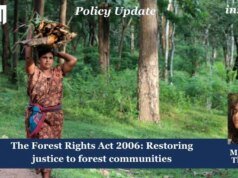Bhairvi Kushwah
Based on government and institutional reports, including the World Bank’s review of SHG impacts and evaluations of DAY-NRLM, this blog attempts to propose grounded policy interventions.

In the heart of rural India, women from a Self-Help Group raise their voices not just in unison, but in leadership. What was once a space of silence now echoes with strength.
Image Source:- globalcommunities.org
Introduction
Until a few years back, in dusty lanes of a tribal hamlet in Odisha, silence would thunder louder than words. Mamata, a 34-year-old mother of three, is now raising her voice in unison with numerous women who are rewriting the rules of rural power in a crowded Gram Sabha.
Her journey initiated once she joined a Self-Help Group (SHG) constituted under National Rural Livelihoods Mission (NRLM). From being a simple saving circle, the group soon metamorphosed into a form of resistance where unsafe drinking water, broken toilets in schools, and misplaced anganwadi rations were no longer issues whispered about but confronted head-on. When the sarpanch declined to act, the SHG lodged a formal complaint with the collected authority. The tanker trucks came in, followed by accountability, her voice was heard in Gram Sabha for the first time. Her story is no exception. it is a strong indicator.
As of 2024, the mobilization of 9.1 crore women through 7.5 lakh SHGs under DAY-NRLM has sent numerous women into public life. Auditing MGNREGA works, supervising anganwadi centres, and even the planning of local development are undertaken by these women, especially from Dalit, Adivasi, and other marginalized sections, turning SHGs into landing grounds of governance from below, reclaiming the democratic spaces which were long denied. A quiet, mostly unseen revolution in feminist self-governance is confronting rural power structures in india, one village at a time.
Beyond Livelihoods: Women’s Collectives as Governance Actors
Initially, SHG emerged at village levels from small, informal, women-oriented voluntary savings groups and are now passing through transformation into agents with stronger governance capacity. Until recently, SHGs used to be more into microfinance and income-generation but are now increasingly performing public functions, such as monitoring schemes, influencing development plans, and holding local systems to account.
Across Kerala, Bihar, Jharkhand, and Tamil Nadu, SHG federations are conducting social audits, ensuring PDS is appropriately distributed, pointing out corruption in MGNREGA implementation, and requesting transparency in Gram Sabha processes. Only in the state of Bihar, more than 4,000 cluster-level federations have been trained under the JEEViKA program to monitor food security implementation, education delivery, and grievance redressal mechanisms at the level of panchayats (BRLPS 2023).
The network of Kudumbashree in Kerala, one of the largest such networks led by women anywhere in the world, is participating in standing committees at the village level. Such places led by women are often the only public venues where Dalit or Adivasi or Muslim women might have a voice. They are not mere attendees at local meetings, they are leading them. Women are filing applications under the RTI Act, lodging complaints, mobilizing neighbours, and confronting sick sarpanches who never gave their problems a hearing earlier. In Tamil Nadu, there are about 15,000 SHG members in village-level Health and Sanitation Committees that make decisions regarding water safety and public hygiene (TN RDPR, 2023).
As the SHG leader from Jharkhand said emphatically, “We are no longer asking for permission to speak. We are asking for action.”
This shift is not just a governance innovation. It is that silent feminist revolution that is shaping the future of rural democracy in India.
Challenges and Structural Exclusion
While Self-Help Groups are increasingly becoming visible actors in local governance, this transformation is far from uniform and far from complete. For many rural women, especially those from Dalit, Adivasi, and minority communities, the path to leadership remains riddled with invisible ceilings and visible exclusions.
- Caste- and Class-Based Exclusions: By and large, Gram Panchayat continues to enjoy domination by the local elites in different villages. Such SHG women are invited to the local decision-making bodies. In actual decision-making, they are most often sidelined. In the case of Dalit and Adivasi women, these barriers take on sharper edges as in some cases they undergo resistance of the male sarpanches to their entry into these bodies and at times they face the indignity of being sidelined within the SHGs themselves, especially when the dominant caste women are in the control. According to a 2022 SEWA Bharat study, less than 18% of Dalit SHG members reported speaking in a Gram Sabha even when present.
- State Level Gaps and Institutional Neglect: In a few states such as Uttar Pradesh and Rajasthan where NRLM is poorly implemented, SHGs more often than not, do not receive any facilitation or training, or get involved at all with local governance bodies. Thus, their empty expenditure for their sustenance is beyond thrift and credit.Knowledge of this sort is frequently declared as “non-expert” knowledge since it is rooted in lived experience. This epistemic injustice keeps rural women from influencing formal governance they are heard of, but not really listened to.
- Tokenism and Co-option: Across various places the SHGs are actively co-opted into the top-down delivery system, expecting them to implement welfare schemes, without having any say in the scheme design or the allocation of budgets. This transformation turns them from agents into instruments; grassroots leadership into performative participation. Decentralization is power-sharing, not task-sharing.
And the women continue to resist this.
A Dalit woman from Jharkhand, Meera Devi, whose SHG has been able to revive a long-defunct water scheme, expressed:
“I had never imagined speaking in public before the village. But with my group behind me, I found my voice.” Meera’s stories are not very rare, and are increasingly multiplying; yet if we do not address structural inequities soon, these voices might as well be drowned by systems that continue to silence women with a smile.
Policy Recommendations: From Participation to Power
In order to rise above token inclusion and allow true governance by women through a feminist lens, India’s grassroots rural governance structures shall take SHG women particularly from the most downtrodden communities as its equals. These in turn call for three immediate interventions:
Institutionalize SHG Representation in Local Governance
- So, amend the state-level Panchayati Raj Acts to require representation by SHG federations (especially those of DAY-NRLM) in Ward Committees, Village Planning Boards, and Gram Sabha Standing Committees.
- There should be decision-making power for SHGs regarding issues concerning sanitation, nutrition, housing, and budget allocation, not just attendance.
- Model after Kerala’s Kudumbashree and Tamil Nadu’s Health Committees.
Intersectional Capacity Building and Feminist Political Literacy
- Initiate targeted training programs for SHG women from Dalit, Adivasi, Muslim, and other underrepresented communities.
- Translate these beyond being just finance literacy also include constitutional rights, RTI, grievance redressal mechanisms, and gendered governance.
- Collaborate with institutions such as NIRDPR, PRIA, and feminist NGOs for delivery in local languages and accessible formats.
Ensure SHGs Perform Social Audits and Accountability Budgets
- Enable SHGs to conduct social audits for measuring the implementation of schemes like MGNREGA, PMAY, ICDS, etc., and link their findings to the District Review Committee.
- Provide honorarium to audit committee members in SHGs and provide them legal status as per DAY-NRLM guidelines.
- Design “Accountability Budgets” wherein the feedback generated by SHGs should influence the reallocation of funds at the Gram Panchayat levels.
- Feminist self-organization is not about more meetings but about more meaningful mandates in the hands of women who have long been kept outside the room.
Conclusion
Decentralization is supposed to be the foundation of democracies, so excluding rural women from decision-making is unjust; democracy does not admit any such thing. Self-Help Groups are not merely mechanisms for credit or welfare disbursal. They are living institutions of feminist governance, where the collective voice and community wisdom meet with political courage.
Mamata is never alone in the Gram Sabha today. She goes with an unspoken repertoire of hopes from millions of hopes drowned from trapped Dalit women told to keep quiet, hopes dismissed from tribal women whose wisdom was devalued, and hopes of mothers who had never thought that their daughters would lead one day.
Genuine decentralization means neither the delegation of tasks nor the delegation of responsibilities,it means the delegation of trust: trust in the leadership of rural women, trust in their experiences lived out in reality, and trust in their capacity to dream and realize the just future together.
When that happens, not only is a tribal woman conducting a social audit on a welfare scheme or a Dalit woman presiding over a village meeting, but they have also begun to reshape the pragmatic face of democracy from the ground-up not of some charitable act but the rightful claim to power.
References
Disclaimer: All views expressed in the article belong solely to the author and not necessarily to the organization.
About the Author
Bhairavi Kushwah is an LPPYF 5.0 fellow and a postgraduate student of Public Administration at Jamia Millia Islamia. She stands for grassroots governance, educational equity, and gender justice. She also draws from her lived experiences and community participation across India for her research field, which lies at the intersection of policy, gender, and rural transformation.
Acknowledgment
I extend heartfelt gratitude to the IMPRI team for constant guidance and support, and to the women across India who have inspired this work with their bravery, resilience, and grassroots leadership.
Read More at IMPRI
MINISTRY OF HEAVY INDUSTRIES
IMD’s UPGRADATION OF FORECAST SYSTEM, 2021



















